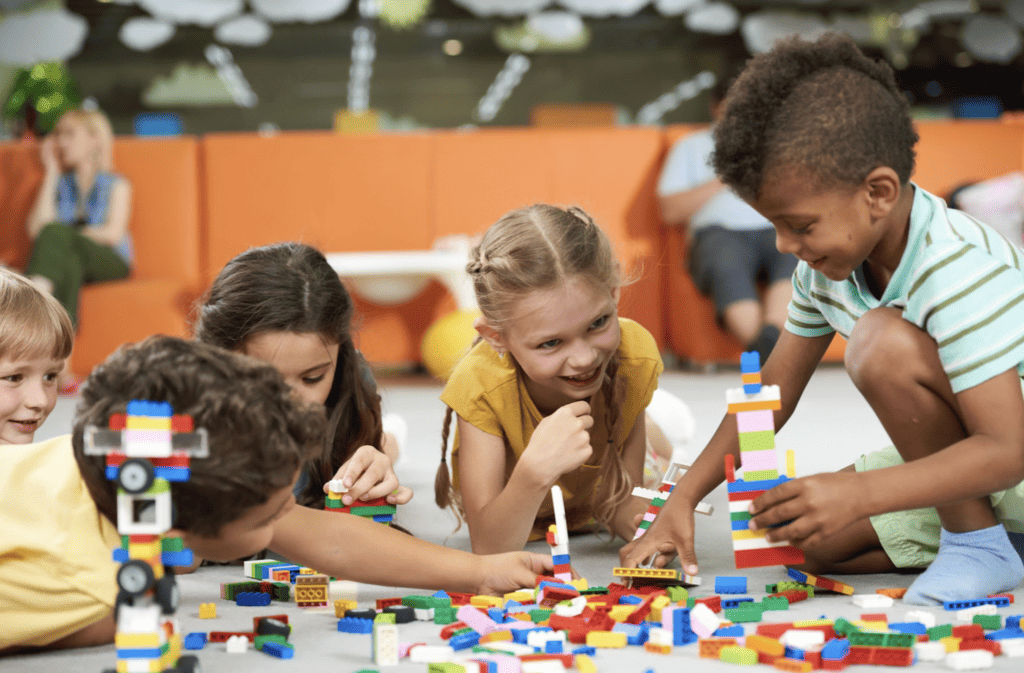Preschool is essential to your child’s learning, equipping them with basic skills they can apply for life. Social skills like making friends are a big deal. And guess what? Playtime is a fun and fantastic way to help your little one in acquiring social skills.
This article will discuss why being good with people is crucial, how playing helps them learn these skills, and some easy things you can do as a parent or teacher to help your preschooler get even better at making friends.
What Are Social Skills?
Social skills, including communication, cooperation, empathy, and conflict resolution, are essential for your child’s harmonious interactions. Socially skilled children exhibit positive behavior, preparing them for success in adulthood and fostering cultural competence. Parents, educators, and caregivers are key in providing guidance and opportunities for social skill development during the formative years.
Play as a Gateway to Social Development
Play serves as a gateway to social development in childhood, functioning as a powerful tool for learning. In the realm of social development, it offers preschoolers chances to practice and enhance their social skills naturally and enjoyably. Through play, children develop crucial aspects of effective social interaction, such as sharing, taking turns, negotiating, and resolving conflicts.
Different Types of Play and Their Social Benefits
Below are the different types of play for preschool children and their social benefits:
Parallel Play
Parallel play is usually a part of learn and play kindergarten programs, which become significant for your child during the early preschool years. At this stage, children play independently with their peers, exploring toys and activities individually. Even though direct interaction is limited, this behavior fosters social awareness as your child becomes familiar with the presence of others in their environment. Witness your child’s exploration and note how they observe and imitate their peers, incorporating new skills into their play.
Parallel play offers a sense of comfort and security, allowing your child to transition to more interactive forms of the game gradually. This stage serves as a foundation for developing crucial social skills. Watch as your child progresses from parallel play to cooperative play, learning to share, take turns, and collaborate with others. Remember that the duration and prevalence of parallel play can vary across cultures.
Cooperative Play
As your child grows, they naturally progress to cooperative play, where collaboration takes center stage. During this phase, children actively engage with their peers, working together on shared activities and pursuing common goals. Cooperative play goes beyond independent exploration, emphasizing teamwork and communication and cultivating a sense of community.
Observe your child as they participate in collaborative endeavors, witnessing the emergence of essential social skills. Through cooperative play, your child learns the art of communication, sharing, and working towards shared objectives.
Imaginative Play
If you’re raising a large family, playtime is a great bonding activity. Engaging in imaginative play allows you to explore diverse roles and scenarios, fostering your child’s creativity and empathy. Whether you’re playing house, doctor, or superhero, you acquire the ability to comprehend and navigate various social roles. This type of play enables your child to immerse themselves in different situations, promoting a deeper understanding of the world.
Practical Strategies for Building Social Skills Through Play
Facilitate Playdates
Facilitating playdates with your child’s peers is a valuable strategy to promote social interaction beyond the preschool setting. Establish open communication with other parents to coordinate schedules and preferences. Clearly communicate the purpose of the playdate, whether it’s for socializing, engaging in specific activities, or fostering particular skills.
During the playdate, encourage positive interaction and allow the children space to engage independently while providing guidance when needed. Having some snacks and refreshments available adds a casual and enjoyable element to the occasion. Be flexible with plans, as spontaneous moments can lead to unexpected fun.
Choose Socially Rich Toys
When selecting toys for your child, opt for socially rich options like board games, building blocks, and collaborative art projects. These toys encourage cooperation and communication, fostering important social skills. Your child will learn to work with others, express themselves, and navigate conflicts, promoting positive social development. Additionally, engaging in shared activities creates a sense of belonging and strengthens bonds with peers.
Provide Structured Play Activities
Structured play involves activities that include tag or hide-and-seek, puzzles, science experiments, and role-playing scenarios like playing house. These activities are designed to promote teamwork, coordination, creativity, problem-solving, and effective communication.
The benefits of structured play are numerous. It fosters social development by encouraging interaction, communication, and conflict resolution. Engaging with rules enhances cognitive skills, such as problem-solving and critical thinking. Additionally, it aids in emotional regulation by providing a controlled environment for children to manage success and failure. Furthermore, structured play contributes to language development as children express ideas and negotiate with peers.
Conclusion
Help your preschooler develop their social skills through play by applying the tips above. Be there as a supporter of your child’s social journey and enjoy the experience. You can invest in the right tools and quality preschool education alongside play activities. Doing so provides a holistic approach to letting your child grow with confident social, academic, and life skills.
